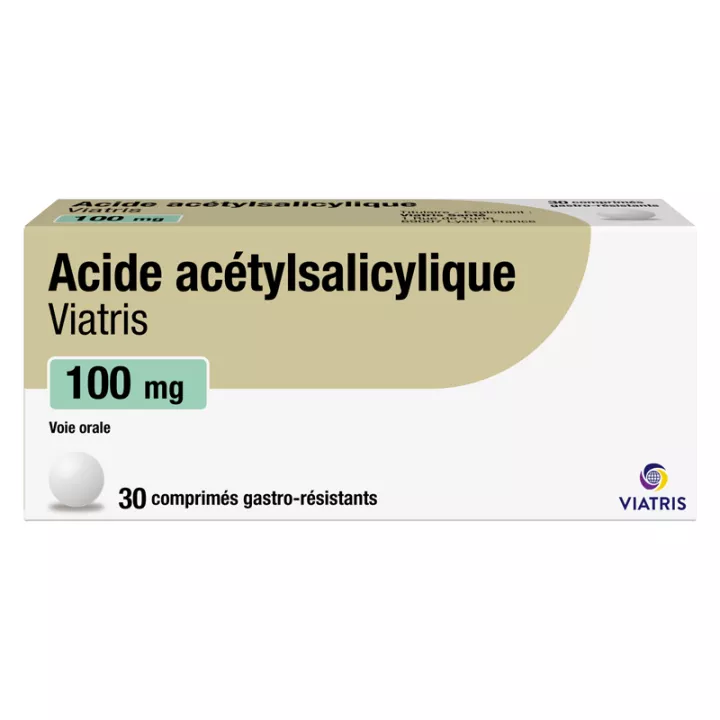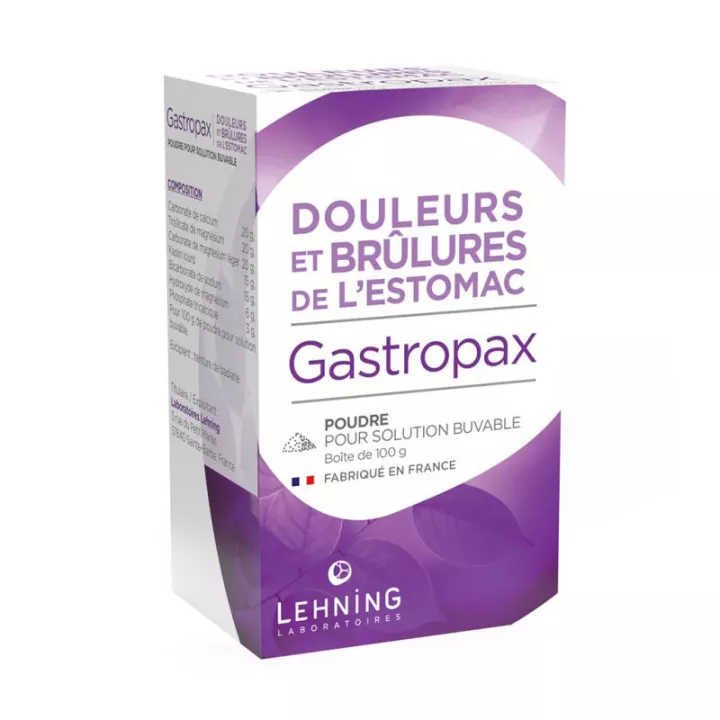NOTICE
ANSM - Updated on: 05/27/2020
Name of the drug
ACETYLSALICYLIC ACID MYLAN 100 mg gastro-resistant tablets
Acetylsalicylic acid
Framed
Read all of this leaflet carefully before taking this medicine because it contains important information for you.
You should always take this medicine carefully following the information given in this leaflet or by your doctor or pharmacist.
· Keep this leaflet. You might need to read it again.
· Contact your pharmacist for any advice or information.
· If you get any side effects, talk to your doctor, pharmacist or nurse. This also applies to any side effects that are not mentioned in this leaflet. See section 4.
· You should contact your doctor if you do not feel any improvement or if you feel less well.
What does this booklet contain ?
1. What is ACETYLSALICYLIC ACID MYLAN 100 mg, gastro-resistant tablet and in which cases it is used?
2. What should I know before taking ACETYLSALICYLIC ACID MYLAN 100 mg, gastro-resistant tablet?
3. How to take ACETYLSALICYLIC ACID MYLAN 100 mg, gastro-resistant tablet?
4. What are the possible side effects?
5. How to store ACETYLSALICYLIC ACID MYLAN 100 mg, gastro-resistant tablet?
6. Contents of the pack and other information.
1. WHAT ACETYLSALICYLIC ACID MYLAN 100 mg, gastro-resistant tablet AND WHAT IT IS USED FOR?
Pharmacotherapeutic group: antithrombotic / antiplatelet agent, excluding heparin , ATC code B01AC06.
ACETYLSALICYLIC ACID MYLAN 100 mg gastro-resistant tablet contains acetylsalicylic acid, which in low doses belongs to a group of medicines called antiplatelet agents. Platelets are small blood cells that cause blood to clot and are involved in the phenomenon of thrombosis. When a blood clot forms in an artery, it blocks the blood flow and oxygen supply. In the heart, it can cause a heart attack or angina; in the brain, it can cause a cerebrovascular accident (stroke).
ACETYLSALICYLIC ACID MYLAN 100 mg gastro-resistant tablet is used to reduce the risk of blood clots and thus prevent the occurrence of:
· heart attack.
· stroke.
· cardiovascular problems in patients with stable or unstable angina (a type of chest pain).
ACETYLSALICYLIC ACID MYLAN is also used in patients who have had certain types of heart operations to widen or unclog the blood vessels.
This medication is not recommended in emergency situations. It can only be used as a preventive treatment.
2. WHAT YOU NEED TO KNOW BEFORE YOU TAKE ACETYLSALICYLIC ACID MYLAN 100 mg, gastro-resistant tablet?
Do not take ACETYLSALICYLIC ACID MYLAN 100 mg, gastro-resistant tablet:
· if you are allergic to acetylsalicylic acid or any of the other ingredients of this medicine, listed in section 6 .
· if you are allergic to other salicylates or to nonsteroidal anti-inflammatory drugs (NSAIDs). NSAIDs are often used to treat arthritis, rheumatism, and pain relief.
· if you have had an asthma attack or edema (swelling of the face, lips, throat or tongue: angioedema) after taking salicylates or NSAIDs.
· if you suffer or have suffered from a stomach or duodenal ulcer or any other type of bleeding, such as a stroke.
· if you suffer from blood clotting problems.
· if you have severe liver or kidney disease.
· if you have severe heart problems which may cause shortness of breath or swelling of the ankles
· if you are currently in the third trimester of pregnancy, you should not use doses higher than 100 mg / day ( see section “Pregnancy and breast-feeding” ).
· if you are taking a medicine called methotrexate (for example for cancer or rheumatoid arthritis) at doses greater than 15 mg / week.
Warnings and Precautions
Talk to your doctor, pharmacist or nurse before taking ACETYLSALICYLIC ACID MYLAN 100 mg, gastro-resistant tablet. :
· if you have liver, kidney or heart disease.
· if you have or have ever had stomach or small intestine ulcers which may cause bleeding. These type of ulcers are open sores that develop in the stomach and small intestine.
· if you are taking anticoagulants (medicines used to thin the blood)
· if you have uncontrolled high blood pressure
· if you have asthma, suffer from allergic rhinitis (eg hay fever), increases in nasal mucous membranes (polyps in the nose) or chronic respiratory disease; acetylsalicylic acid can cause an asthma attack.
· if you are elderly. The elderly are particularly sensitive to the side effects of NSAIDs, including acetylsalicylic acid.
· if you have ever suffered from gout
· if you have a heavy period
· if you are taking medicines which can affect the process of stopping the flow of blood, which is the mechanism by which blood is kept inside the blood vessels (hemostasis)
· if you are taking medicines that increase the risk of developing an ulcer such as oral corticosteroids (used to reduce inflammation); selective serotonin reuptake inhibitors (used as antidepressants) or deferasirox (used to suppress excess iron in the body)
· if you suffer from glucose-6-phosphate dehydrogenase (G6PD) deficiency
You should seek medical advice immediately if your symptoms get worse or if you experience any serious or unexpected side effects, such as unusual bleeding, severe skin reactions or any other sign of serious allergy ( see section 'Possible side effects ? ” ).
Tell your doctor if you are planning to have an operation (even a minor one, such as a tooth extraction) because acetylsalicylic acid is a blood thinner, there may be an increased risk of bleeding.
You must take care not to become dehydrated (you may be thirsty, have a dry mouth) since the use of acetylsalicylic acid can lead to deterioration of kidney function.
This medication cannot be used as an analgesic or fever reducer.
If any of the above applies to you, or if you are not sure, talk to your doctor or pharmacist.
Children and adolescents
Acetylsalicylic acid can cause Reye's syndrome when given to children. Reye's syndrome is a very rare disease that affects the brain and liver, which can be fatal. For this reason, ACETYLSALICYLIC ACID MYLAN 100 mg, gastro-resistant tablet should not be administered to children under 16 years of age, except on the advice of a doctor.
Other medicines and ACETYLSALICYLIC ACID MYLAN 100 mg, gastro-resistant tablet
Tell your doctor or pharmacist if you are taking, have recently taken or might take any other medicines, including medicines obtained without a prescription.
The effect of treatment may be influenced if acetylsalicylic acid is taken at the same time as other medicines used for:
· to thin the blood or to prevent blood clots (eg coumarin, warfarin, heparin, clopidogrel, alteplase, ticlopidine, cilostazole and dipyrimidole).
· avoid organ rejection after transplantation (ciclosporin, tacrolimus).
· high blood pressure (diuretics and ACE inhibitors).
· regulate the beating of the heart (digoxin).
· treat manic-depressive illness (lithium).
· pain and inflammation (NSAIDs like ibuprofen, or steroids).
· gout (probenecid, sulfinpyrazone).
· epilepsy (valproate, phenytoin).
· glaucoma (acetazolamide).
· cancer or rheumatoid arthritis (methotrexate at doses less than 15 mg / week).
· diabetes (eg sulfonylureas or insulin).
· depression (selective serotonin reuptake inhibitors (SSRIs) such as sertraline or paroxetine).
· medicines used as hormone replacement therapy when the adrenal glands or pituitary gland has been destroyed, or to treat inflammation including rheumatic disease or inflammation of the intestine (corticosteroids).
Metamizole (a substance that reduces pain and fever) may reduce the effect of acetylsalicylic acid on platelet aggregation (adhesion of blood cells to each other and formation of a blood clot), when taken at the same time time. Therefore, this combination should be used with caution in patients taking low dose aspirin for cardioprotection.
ACETYLSALICYLIC ACID MYLAN 100 mg gastro-resistant tablets with alcohol
Drinking alcohol can potentially increase the risk of gastrointestinal bleeding and prolong bleeding time.
Pregnancy and breast feeding
If you are pregnant or breast-feeding, think you may be pregnant or are planning to have a baby, ask your doctor or pharmacist for advice before taking this medicine.
Pregnancy
Pregnant women should not take ACETYLSALICYLIC ACID MYLAN 100 mg, gastro-resistant tablet during pregnancy except on medical advice.
You should not take ACETYLSALICYLIC ACID MYLAN 100 mg gastro-resistant tablet if you are in the last 3 months of pregnancy, unless your doctor has told you to, and the dose should not exceed 100 mg per day ( see section “Do not take ACETYLSALICYLIC ACID MYLAN 100 mg, gastro-resistant tablet” .
Normal or high doses of this medicine during the last months of pregnancy can have serious consequences for you and your child.
Feeding with milk
Women who are breastfeeding should not take acetylsalicylic acid except on medical advice.
Driving and using machines
ACETYLSALICYLIC ACID MYLAN 100 mg, gastro-resistant tablet should not affect driving or using machines.
ACETYLSALICYLIC ACID MYLAN 100 mg gastro-resistant tablet contains lactose
If your doctor has informed you of an intolerance to certain sugars, consult your doctor before taking this medicine.
3. HOW TO TAKE ACETYLSALICYLIC ACID MYLAN 100 mg, gastro-resistant tablet?
Always take this medicine exactly as described in this leaflet or as your doctor or pharmacist has told you. Check with your doctor, pharmacist or nurse if in doubt.
Adults
Prevention of heart attacks :
The recommended dose is 100 mg once a day.
Prevention of strokes:
The recommended dose is 100 mg once a day.
Prevention of cardiovascular problems in patients who have stable or unstable angina (a type of chest pain):
The recommended dose is 100 mg once a day.
Prevention of blood clots after certain types of heart surgery:
The recommended dose is 100 mg once a day .
Elderly subject
As for adults. ACETYLSALICYLIC ACID MYLAN 100 mg gastro-resistant tablets should be used with caution in the elderly who are more sensitive to side effects. The treatment should be reviewed regularly.
Use in children and adolescents
Acetylsalicylic acid should not be given to children and adolescents under 16 years of age unless prescribed by a doctor (see section “Warnings and precautions”).
Administration mode
Oral route.
The tablets should be swallowed whole with sufficient drink (1/2 glass of water). The tablets have an enteric coating which protects the stomach from irritation; they should therefore not be crushed, broken or chewed.
If you take more ACETYLSALICYLIC ACID MYLAN 100 mg, gastro-resistant tablet than you should
If you (or someone else) accidentally take too many tablets, contact your doctor immediately or go to the nearest emergency department. Show the remaining tablets or the empty box to the doctor.
Symptoms of overdose may include ringing in the ears, hearing problems, headache, dizziness, confusion, nausea, vomiting, and abdominal pain. Large overdose may cause: rapid breathing (hyperventilation), fever and excessive sweating which can lead to dehydration (you may feel restless, have fits (convulsions), hallucinations, hypoglycaemia), coma and shock.
If you forget to take ACETYLSALICYLIC ACID MYLAN 100 mg, gastro-resistant tablet
If you miss a dose, wait until your next dose is due and then continue taking the medicine as usual.
Do not take a double dose to make up for the dose you forgot to take.
If you stop taking ACETYLSALICYLIC ACID MYLAN 100 mg, gastro-resistant tablet
If you stop taking ACETYLSALICYLIC ACID MYLAN 100 mg, gastro-resistant tablet, contact your doctor or pharmacist.
If you have any further questions on the use of this medicine, ask your doctor or pharmacist for more information.
4. WHAT ARE THE POSSIBLE SIDE EFFECTS?
Like all medicines, this medicine can cause side effects, although not everybody gets them.
If you notice any of the following serious side effects, stop taking ACETYLSALICYLIC ACID Mylan 100 mg gastro-resistant tablets and contact a doctor immediately:
Rare side effects (may affect up to 1 in 1,000 people):
· Serious allergic reactions which may have the following symptoms: swelling of the face, tongue, larynx, abdomen, or arms and legs, rash with itching, shortness of breath, vomiting, dizziness and low blood pressure.
· Redness of the skin with blistering or peeling which may be associated with high fever and joint pain. This can lead to erythema multiforme, Stevens-Johnson syndrome or Lyell syndrome,
· Brain haemorrhage (acute bleeding inside the skull or brain). Symptoms may include a severe and sudden headache and stroke-like symptoms (such as slurred speech and weakness on one side of the body, nausea or vomiting, vision, seizures or loss of consciousness).
Side effects with frequency not known (frequency cannot be estimated from the available data):
· unusual bleeding: blood found in sputum, vomiting, urine and stool (black stool).
· acute kidney failure (sudden damage to the kidneys that prevents them from functioning normally). Symptoms may include nausea or vomiting, dehydration, confusion, high blood pressure, stomach ache, mild back pain, and fluid buildup in the body).
Other side effects including:
Common side effects (may affect up to 1 in 10 people):
· nausea, vomiting, diarrhea
· indigestion,
· increased tendency to bleeding.
Uncommon side effects (may affect up to 1 in 100 people):
· urticaria,
· runny nose
· difficulty in breathing.
Rare side effects (may affect up to 1 in 1,000 people):
· severe bleeding in the stomach or intestines,
· change in the number of blood cells
· bronchospasm (tightening of the muscles that line the airways (bronchi) in your lungs: your chest tightens and you may have trouble catching your breath
· asthma attack,
· inflammation of the blood vessels,
· bruises with purple spots (skin bleeding),
· erythema nodosum (swelling of the subcutaneous fat resulting in bumps and red spots)
· Reye's syndrome (very rare childhood disease that affects the brain and liver (see section 2 'Children and adolescents')
· abnormal, heavy or prolonged menstrual bleeding.
Side effects with frequency not known (frequency cannot be estimated from the available data):
· ringing in the ears (tinnitus) or reduced hearing acuity
· headache,
· vertigo (feeling dizzy),
· ulcers in the stomach or small intestine and perforation,
· prolonged bleeding time such as bleeding from the nose and gums,
· kidney disease,
· liver disease,
· high levels of liver enzymes in the blood
· high level of uric acid in the blood.
Reporting of side effects
If you get any side effects talk to your doctor, pharmacist or nurse. This also applies to any side effects that are not mentioned in this leaflet. You can also report side effects directly via the national reporting system: National Agency for Medicines and Health Products Safety (ANSM) and network of Regional Pharmacovigilance Centers - Website: www.signalement-sante.gouv.fr
By reporting side effects you can help provide more information on the safety of this medicine.
5. HOW TO STORE ACETYLSALICYLIC ACID MYLAN 100 mg, gastro-resistant tablet?
Keep this medication out of the sight and reach of children.
Store at a temperature not exceeding 30 ° C.
Do not use this medicine after the expiry date which is stated on the carton after "EXP". The expiration date refers to the last day of that month.
Do not throw away any medicine via wastewater or household waste. Ask your pharmacist how to throw away medicines you no longer use. These measures will help protect the environment.
6. CONTENTS OF THE PACKAGE AND OTHER INFORMATION
What ACETYLSALICYLIC ACID Mylan contains 100 mg, gastro-resistant tablet
· The active substance is acetylsalicylic acid.
Acetylsalicylic acid................................................ .................................................. ........ 100 mg
For a tablet.
· The other ingredients are: lactose monohydrate, microcrystalline cellulose, colloidal anhydrous silica , potato starch, talc, triacetin and copolymer of methacrylic acid and ethyl acrylate (1: 1).
What is ACETYLSALICYLIC ACID MYLAN 100 mg, gastro-resistant tablet and contents of the pack
ACETYLSALICYLIC ACID MYLAN 100 mg gastro-resistant tablet is a white, round, biconvex, gastro-resistant tablet of approximately 8.1 mm in diameter and 3.5 mm in thickness.
Each box contains 30 tablets.
Marketing authorization holder
MYLAN SAS
117 ALLEE DES PARKS
69800 SAINT PRIEST
Marketing authorization operator
MYLAN SAS
117 ALLEE DES PARKS
69800 SAINT PRIEST
Maker
GL PHARMA GmbH
SCHLOSSPLATZ 1
8502 LANNACH
AUSTRIA
Names of the drug in the Member States of the European Economic Area
This medication is authorized in the Member States of the European Economic Area under the following names: In accordance with the regulations in force.
[To be completed later by the holder]
The last date on which this leaflet was revised is:
{month YYYY}
Other
Detailed information on this medication is available on the ANSM website (France).







